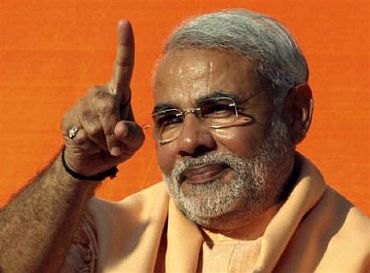
The ghost of the 2002 Gujarat riots continued to haunt Chief Minister Narendra Modi who was grilled for the first time by the Supreme Court-appointed Special Investigation Team this year.
But the year, which also saw Gujarat kicking off golden jubilee celebrations to mark the 50th year of its foundation, ended on a happy note for Modi's Bharatiya Janata Party as it swept the civic and local body polls.
The Modi government was involved in a stand-off with Governor Kamla Beniwal over the compulsory voting bill for the local body polls. Though the bill was stalled, Gujarat did see the first e-votes of the country being polled in the elections to six municipal corporations held in October.
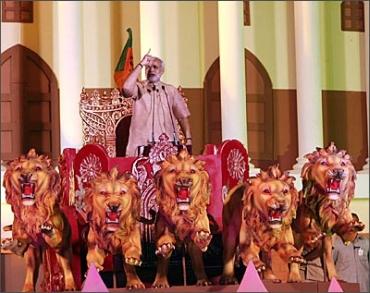
The SIT questioned 60-year-old Modi in two sessions for over nine hours on March 27 on a complaint made by Jakia Jaffery, widow of former Congress Member of Parliament Eshan Jaffery, who was killed in Gulburg society during the 2002 riots. This was the first time that Modi had to give answers to an investigating agency on allegations of complicity in the 2002 post-Godhra riots.
The SIT has submitted its report on the questioning of Modi in a sealed cover to the Supreme Court. Modi described the questioning as a difficult moment of his life.
Amid high drama, his trusted aide and junior home minister Shah was arrested by the CBI on July 25, in connection with the Sohrabuddin encounter of 2005. He resigned from Modi's cabinet a day before his arrest.
The investigating agency, to which the Supreme Court handed over the investigations, accused Shah of being the main conspirator and charged him with murder, kidnapping and extortion. After failing to reply to two CBI summons, Shah made a dramatic appearance in a hurriedly-convened press conference at the state Bharatiya Janata Party headquarter four days after he was served the first notice. He then drove to the CBI office and was arrested by agency officials.
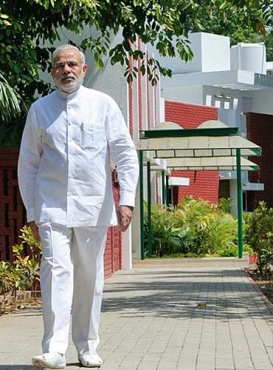
Shah is now out on bail after the Gujarat high court accepted his plea. However, the CBI has approached the Supreme Court against the HC's decision, after which the apex court has barred him from entering Gujarat till his case is decided.
The local body elections held in October after these two episodes were being considered as a litmus test for the BJP and Modi. The BJP won elections in all six municipal corporations, 21 out of 24 district panchayats, 42 out of 53 municipalities and 145 taluka panchayats out of 208, routing the main opposition Congress.
The Opposition Congress, which was already a depleted force in the state after consecutive losses to BJP in assembly elections, saw its traditional vote share going down.
Congress president Siddarth Patel announced his decision to quit after the debacle, while leader of Opposition Shaktisinh Gohil also sent his resignation to party president Sonia Gandhi. However, the party has not replaced them.
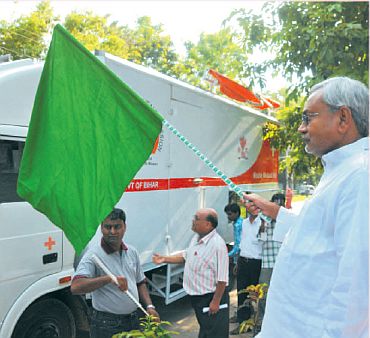
Modi was also involved in a bitter row with Bihar Chief Minister and Janata Dal United leader Nitish Kumar over advertisements in Bihar dailies on aid given by Gujarat for Kosi flood victims in June, when the BJP was holding its national executive in Patna. Kumar returned Rs 5 crore fund given by Gujarat as a mark of protest.
Also, during the multi-phased elections of Bihar assembly, Modi was kept away from campaigning after Kumar and the JD-U made clear their reservations to BJP on the issue.
In a setback to the ambitious plan of Modi to make voting compulsory in local body polls, the governor in April returned the Gujarat Local Authorities Law (Amendment) Bill 2009 saying it violates Article 19 of the Constitution, guaranteeing freedom of speech and expression.
The governor had also raised objections on the provision of the bill, which stated that those who will not cast their franchise will be liable for punishment. The bill was passed by the state assembly in December 2009. Undeterred by the governor's stand, the Gujarat assembly passed the bill in the same form in September and sent it for her approval once again.
In a another move aimed at initiating reforms in the electoral process, the State Election Commission introduced the option of online voting in the elections of the six municipal corporations of the state.
The first e-votes of the country were polled during the municipal corporation elections.
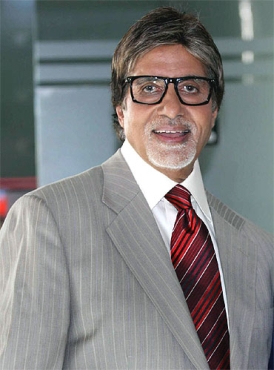
The state government started a unique programme called 'garib kalyan mela' in Gujarat where poor people were given direct benefit of all government schemes, by-passing all the middle men, at nearly 100 meetings across the state.
Modi also managed to rope in superstar Amitabh Bachchan as brand ambassador of Gujarat tourism. He also expanded his cabinet in August, inducting four new ministers of state. In a surprise choice, first time MLA Prafful Patel was made minister of state for home in place of Shah. The Gujarat government also launched golden jubilee celebrations, marking 50th year of its formation.